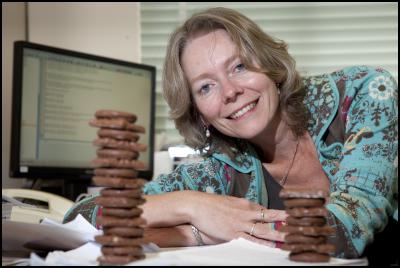Quakes: Women Turned To Unhealthy Food To Cope With Stress
Women Turned To Unhealthy Food To Cope With Stress
After The Quakes, UC Research Finds
March 26, 2013
Christchurch women’s eating habits became unhealthier after the earthquakes to cope with stress, a University of Canterbury (UC) researcher has found.
UC psychology expert Dr Roeline Kuijer said Christchurch women who suffered post-traumatic stress after the quakes reported unhealthier eating habits and were more likely to choose food for mood and familiarity reasons.
``Women with higher levels of self-control were more likely to maintain choosing food for health reasons and natural content. Scores on an earthquake impact index - looking at issues like damage, financial strain, whether or not people had power or water - was unrelated to changes in eating habits or motives for food choice.
``This is the first study in New Zealand and possibly internationally that has examined eating habits and food choices before and after a natural disaster.
``Our study started in 2007 but the focus changed after February 2011 and it became a study that looked at health, well-being and especially eating habits because of the earthquakes.
``The fact that we had participants before the earthquakes makes this study unique. There are very few studies in the international literature that have been able to follow people from before to after a natural disaster.
``They were all Canterbury residents mostly middle aged and 75 percent of them were women. For the research questions relating to eating habits only the responses of women were used.
``We asked them what they ate each day, whether they ate junk food and how much they ate. Until after the earthquakes eating habits were fairly stable. Following the February 2011 earthquake participants started reporting unhealthier eating patterns.
``We were interested in whether food choice had changed after the quakes. What they loved to eat to help them cope with stress, easy food to prepare and familiarity became more important in their food choice,’’ Dr Kuijer said.
Respondents mostly preferred food that made them happy and natural content became less important.
``These findings are important as the short-term negative effects associated with an unhealthy diet, such as low energy and low mood, may make coping in the aftermath of a disaster even more difficult,’’ Dr Kuijer said.

Photos: UC’s
Dr Roeline Kuijier
website: www.canterbury.ac.nz
ENDS


 NZ Rugby League: Kiwi Ferns Ready To Defend Their Pacific Championships Title In Thrilling Final
NZ Rugby League: Kiwi Ferns Ready To Defend Their Pacific Championships Title In Thrilling Final PHARMAC: Newly Funded Medicine To Benefit 110 More People With Thyroid, Liver, And Kidney Cancer
PHARMAC: Newly Funded Medicine To Benefit 110 More People With Thyroid, Liver, And Kidney Cancer Plunket: Plunket’s New One Stop Community Hub Opens In Dunedin
Plunket: Plunket’s New One Stop Community Hub Opens In Dunedin NZ College of Public Health Medicine: Treaty Principles Bill Will Harm Māori Health And Fuel Racial Division
NZ College of Public Health Medicine: Treaty Principles Bill Will Harm Māori Health And Fuel Racial Division SPCA: Concert For Animals - A Hit With Pets And Humans Too
SPCA: Concert For Animals - A Hit With Pets And Humans Too NZ Olympic Committee: NZOC Remembers Olympian #166, Marise Chamberlain
NZ Olympic Committee: NZOC Remembers Olympian #166, Marise Chamberlain